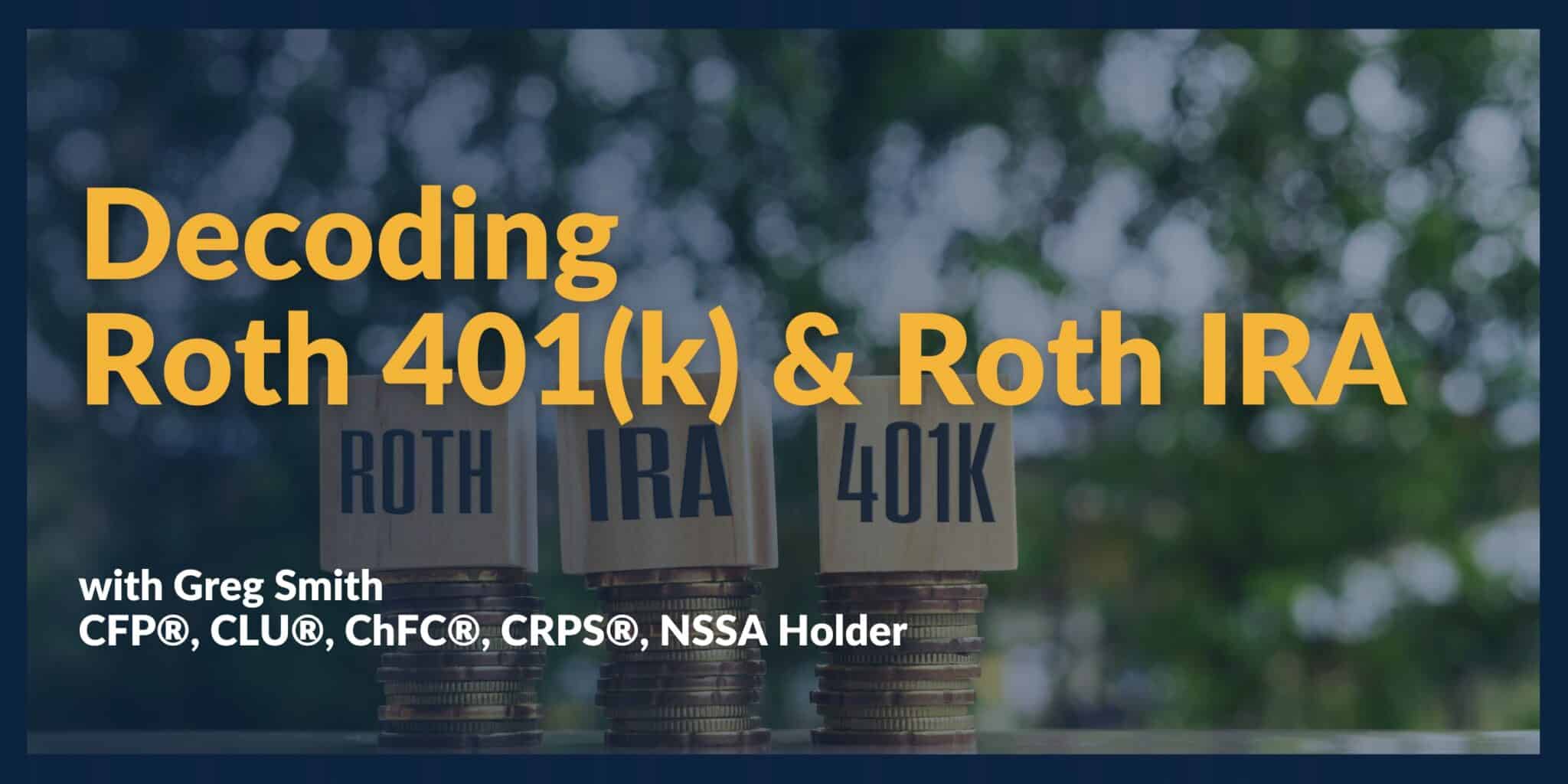Decoding Roth 401(k) and Roth IRA: Key Variations Explained

Planning for retirement involves navigating a multitude of options, and two popular choices that often steal the spotlight are the Roth 401(k) and Roth IRA. While both offer the advantages of tax-free growth, they differ in eligibility, contribution limits, and employer involvement. To make informed decisions and maximize retirement savings, it’s crucial to understand the contrasts between these two vehicles.
In this article, we delve into the key distinctions between Roth 401(k) and Roth IRA, equipping you with the knowledge to choose the right strategy for your financial goals.
Roth 401(k) PROS:
- Higher annual contribution limit. You can contribute up to $22,500 for 2023 ($30,000 if age 50 or over). Some employees may be able to make additional catch-up contributions due to the recently passed SECURE 2.0.
- No income limit for making contributions as there is with a Roth IRA.
- ERISA provides solid creditor protection (generally better than a Roth IRA).
- Can provide for employer-matching contributions.
- The plan may offer loans, which is an option not offered with Roth IRAs.
Roth 401(k) CONS:
- Limited investment choices.
- Participation in a Roth 401(k) is contingent upon being offered by an employer as part of their retirement plan. Eligibility criteria are typically determined by the employer’s plan, and not all employers offer Roth 401(k) options.
- For withdrawals, the ordering rules are different (less advantageous) than a Roth IRA. You must follow the “pro rata” rule, where each distribution has a piece of the earnings, and those earnings could potentially be subject to income tax and penalties.
Roth IRA PROS:
- Unlimited investment choices (except for collectibles, life insurance, and S Corp securities). This makes it easier to hold your highest appreciating investments. That is a big deal since future Roth distributions will be tax-free.
- Easier access to your money. Whatever you put in, in the form of contributions, you can take out immediately without a tax, without penalty, and without a reason and without age justification for any reason at any time.
- Contributions come out first, then earnings. Not subject to the pro-rata rules.
- The Roth IRA is something that allows you to be flexible, to choose where you want to hold it, not only for investment purposes but also for estate planning. For example, if you want to have multiple accounts and certain beneficiaries that you want to keep separate, you can.
- View the pros and cons of converting a traditional IRA to a Roth IRA in this article.
Roth IRA CONS:
- Lower annual contribution limit. You can contribute up to $6,500 for 2023 ($7,500 if age 50 or over).
- Some people may not be able to make Roth IRA contributions at all because they make too much money.
- A Roth IRA is an individual retirement account that you set up and manage independently. Therefore, there are no matching contributions from an employer.
Key Differences Chart:
|
Roth IRA |
Roth 401(k) |
|
|
Eligibility |
Income limits and earned income |
Offered by an employer as part of a plan |
|
Contribution Limits (2023) |
$6,500 ($7,500 if age 50+) |
$22,500 ($30,000 if age 50+) |
|
Employer Involvement |
Not employer-sponsored |
Employer-sponsored retirement plan |
|
Withdrawals |
Qualified withdrawals are tax-free. Not subject to pro-rata rule. |
Qualified withdrawals are tax-free. Subject to pro-rata rule. |
|
Investment Control |
Individual control |
The employer usually determines plan investments |
Please note that the information provided in the chart is a general overview, and specific details may vary based on individual circumstances and current tax laws.
Choosing the Right Path: Maximizing Retirement Savings and Security
Many people don’t know this, but you can contribute to both a Roth IRA AND a Roth 401(k), provided you have the additional income. As you embark on your retirement savings journey, the choice between a Roth 401(k) and a Roth IRA can significantly impact your financial future. By understanding the differences in eligibility, contribution limits, employer involvement, and investment control, you can make an informed decision that aligns with your unique circumstances.
When evaluating such an important financial decision, it is important to consult with a skilled retirement and financial advisor such as Mission Wealth. Whether you opt for the employer-sponsored allure of a Roth 401(k) or the individual control of a Roth IRA, you’re taking a proactive step toward securing a comfortable and tax-efficient retirement.

Mission Wealth Can Help You Retire with Confidence
This may be your first time retiring, but it's not ours. Careful coordination is required to ensure your retirement income strategy is tax-efficient and sustainable. You will face many decisions when retiring. Let us guide you through your options and create a plan.
Mission Wealth’s vision is to provide caring advice that empowers families to achieve their life dreams. Our founders were pioneers in the industry when they embraced the client-first principles of objective advice, comprehensive financial planning, coordination with other professional advisors, and proactive service. We are fiduciaries, and our holistic planning process provides clarity and confidence. For more information on Mission Wealth, please visit missionwealth.com.
To schedule a complimentary meeting with a Mission Wealth financial advisor, contact us today at (805) 882-2360.
Mission Wealth is a Registered Investment Advisor. This commentary reflects the personal opinions, viewpoints, and analyses of the Mission Wealth employees providing such comments. It should not be regarded as a description of advisory services provided by Mission Wealth or performance returns of any Mission Wealth client. The views reflected in the commentary are subject to change at any time without notice. Nothing in this commentary constitutes investment advice, performance data, or any recommendation that any particular security, portfolio of securities, transaction, or investment strategy is suitable for any specific person. Any mention of a particular security and related performance data is not a recommendation to buy or sell that security. Mission Wealth manages its clients’ accounts using a variety of investment techniques and strategies, which are not necessarily discussed in the commentary. Investments in securities involve the risk of loss. Past performance is no guarantee of future results.
Let's Keep in Touch!
Subscribe for exclusive content and timely tips to empower you on your financial journey. Our communications go straight into your inbox, so you'll never miss out on expert advice that can positively impact your life.Recent Retirement Articles

Retirement Plans for Small Business Owners: Building Long-Term Security for You and Your Team
October 29, 2025
6 Financial Steps to Take if You’ve Been Impacted by a Corporate Layoff
September 4, 2025


